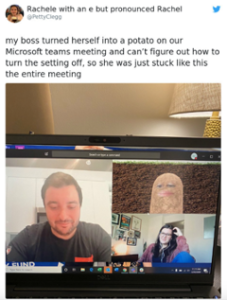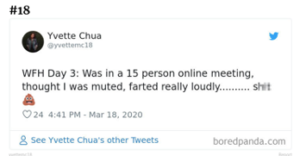Understanding the “new normal” – Don’t be evil!
How Zoom controls our lives and how we can gain back control
Since the coronavirus hit Europe, we have been taken on a journey to a “new normal”. A mode that is supposedly normal but consists of several abnormalities, if you put it in an extreme way. The space in which we normally act has been removed, and our everyday actions are now transferred into our personal spaces by the help of an important third party: Zoom. We now gather for a wide range of activities – both private and professional – without being physically present. Stripped of our normal routines, we unconsciously were thrown into a new normal, without reflecting and challenging this peculiar situation which has been forced upon us. May it be that we more often than not find ourselves walking around in pajama pants in class, being exposed on the Zoom stage when picking our noses or dancing with our professors on Zoom into the late evening.
Entering the stage of Zoom for the fourth, intensive day in a row, our group was somewhat drained but also excited to learn more about how we as individuals can start to understand the current situation, which is centered around an extensive use of man-made technology. How can we start to understand and reflect on a technology that is so close we might not even realize it? How do humans and technology interact to form the experience we currently make?
One interesting opportunity to estrange us from our current (over-)use of Zoom, and the unconscious rules and set of behavior we exhibit, was given to us last night. Dancing with our teachers, showing our armpits and private spaces – these experiences naturally caused some upstir in our class. While some participants experienced the event as deeply unpleasant or even manipulating, others embraced it with great joy. Internally in our small group we came to a common consensus that the event had been somewhat intimidating and uncomfortable to most of us. One important aspect of that was the recording of our dance in the end. Another one was the fact that this was somewhat mandatory, both for extroverts and introverts – just think about it, if we were in Berlin, we could have decided to join a party in the evening, thus having control over who sees us in what condition. Now we did not have this choice. Of course, one could exclude herself from the evening program – but then where is the sense of community on the other hand?
Intellectually today was a day of great learnings. The lecture and following discussions with Simon Denny were a real blast and boosted both our predisposition and creativity. As a real master of his language, he managed to get his message along, even when deprived of visual cues of communication. Interacting with the group through storytelling, video clips, and pictures, he managed to explain fairly complex themes, across many layers of society. With a pen in the hand and minds suddenly lightening up, our group enjoyed a great discussion.
Early into our discussion, one of our group members asked Simon: What is the material footprint related to Zoom? The following discussion would last, non-stop, the whole session. You see, there may be many “hidden” materialistic effects of the use of Zoom on for instance the environment, in particular concerning the energy infrastructure. The interesting thing about video conferencing is that it is not virtual, it is actual. And with actual implication on energy usage, that might be larger than you think!
Also, did you know that the internet has its origins in military tools for surveillance? Or that the servers through which it operates are subject to the law in the country in which it is stationed? In other words, by using Zoom we trust commercial systems with our everyday (private live). And enable them to keep the world under some sort of surveillance. In our group this discussion raised a particularly interesting discussion: Is the COVID-19 situation making us more aware of the dangers and possibility of such systems, thus being way a “wake-up” call with regards to the power of such technologies? Or is the COVID-19 situation the great moment of acceptance/naturalization, where we accept a new level of surveillance into our lives?
While we are no fortunetellers, there are some great opinion pieces out there to reflect on these questions. For example, check out this article by Israeli historian Yuval Harari: https://www.ft.com/content/19d90308-6858-11ea-a3c9-1fe6fedcca75.
Getting closer to the end of what has been an exhausting yet very enlightening week, we are getting closer to a more wholistic perspective on Zoom videoconferencing. With inputs from a historian, a sociologist, our professors, our class (!), several artists and many more other scholars, we were able to gather new important insights into how to approach and understand Zoom. And finally, an approach to improve our current situation for good? While we don’t have an agency to control Zoom, we may push back, we may uncover its vulnerabilities, and we may transfer our understanding of the tool and how it changes what is perceived as normal and abnormal, to you – our peers. So that we can all walk away after this week, with knowledge and tools ready to encounter an even more digitalized normality.
We are looking forward to uncovering the mix of technologies that this current crisis has brought into our lives with you tomorrow!
Xoxo,
The Zoom-bombers – Alma, Bea, Davide, Karolina & Oskar


Screenshots of abnormal things that have happened via Zoom – because life is better when you laugh 😉